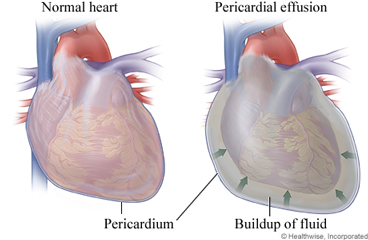
What is surgery for pericardial effusion?
Surgery for pericardial effusion is a procedure to relieve pressure on your heart by draining extra fluid. The tissue sac that surrounds the heart is called the pericardium. Normally, there is a small amount of fluid in it. This fluid surrounds and helps cushion your heart.
Sometimes too much fluid builds up in the sac. This is called pericardial effusion. Extra fluid can be caused by many things, including pericarditis (inflammation of the sac), heart attack, surgery, kidney failure, infection, some cancers, and certain diseases such as lupus. Sometimes the cause is not known.
Surgery for pericardial effusion is sometimes done in an emergency. If a lot of fluid builds up too fast, it can cause increased pressure on your heart. This pressure is called cardiac tamponade. It can reduce the heart's ability to pump blood.
How is the surgery done?
Surgery may be done in different ways. Pericardial window is one type of surgery. Your doctor will tell you more about your surgery and what to expect.
You may be asleep for the surgery, or you may get medicine that will help you relax and not feel pain. Your doctor will make a cut (incision) in your chest. It may be below your breastbone or between two ribs. Your doctor may need to make more than one cut.
Then your doctor will make a cut in the sac that surrounds your heart. A tube (catheter) may be used to drain fluid from the sac. Some fluid or a small piece of the sac may be saved and sent to a lab for tests.
When the surgery is finished, your doctor will close the cuts with stitches or staples.
What can you expect after surgery?
You will stay in the hospital for a few days after surgery. Your recovery will depend on what caused the buildup of fluid around your heart and what type of surgery you have.
When you wake up from surgery, you will be sore. You will get medicine to help with the pain. Your chest may be swollen and painful. It may ache or feel stiff for several weeks.
It is common to feel tired for several days or weeks after surgery. Your doctor will give you medicine to help with pain.
The amount of time you will need to recover at home depends on your health and the type of surgery you had. If you work, you will probably need to take at least 1 week off.
Current as of: October 2, 2024
Author: Ignite Healthwise, LLC Staff
Clinical Review Board
All Healthwise education is reviewed by a team that includes physicians, nurses, advanced practitioners, registered dieticians, and other healthcare professionals.

